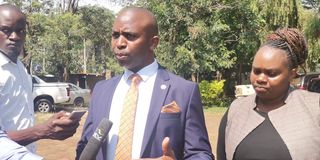Health workers admit they're not prepared to stem Ebola outbreak

Kenya Union of Clinical Officers (KUCO) chairman Peterson Wachira during press briefing on Monday at Kisumu County Referral Hospital. The union says health workers are not prepared for Ebola outbreak in the counties.
Health workers have complained about lack of preparedness in counties to respond to Ebola if the virus finds its way into Kenya.
The workers are not skilled enough to handle the disease, said Kenya Union of Clinical Officers (KUCO) chairman Peterson Wachira.
KUCO identified gaps such as lack of training, unavailability of PPEs and isolation rooms, and sensitisation in the community.
"Our health workers are not prepared to handle an outbreak of the Ebola disease. The medics do not have the basic PPEs that they should be having," Mr Wachira said.
He spoke when county officials toured Kisumu County Referral Hospital to assess its preparedness for Ebola.
"From our assessments, these counties have not done any basic preparations. How can they protect themselves?" he asked.
The Ministry of Health has identified 21 counties that are at high risk of infections.
Mr Wachira said nearly all border counties, such as Migori, Busia and Bungoma, had failed to put in place measures against a possible Ebola case.
"Anybody coming from a hotspot should first be identified at the border point. Secondly, they would be followed up for at least 21 days," he said.
He added: "We expected that somebody would be monitoring these people to ensure that if they have Ebola or symptoms of the disease they will be able to get them early and protect the other people."
With the lack of PPEs, he warned, health workers are at risk of getting Ebola at the border point.
"We have seen some lapses because they have not been trained. If anybody were to come in with Ebola, the first person to be infected is that nurse and clinical officer," Mr Wachira said.
Protective gear
He added: "We expected at the border point to have medics who are sensitised with the right gown, goggles, mask and gloves but those things are not there."
The union lamented a shortage of health workers in public hospitals to handle infectious diseases.
"We don’t seem to have learned from the effects of Covid-19 and are trying to address the issue of a shortage of health workers. The national government needs to get serious. They don’t have to wait for a case to be confirmed. That will be one too many," he said.
Meanwhile, fishermen and people living near Lake Victoria have expressed fears that they will contract Ebola, citing inadequate screening of people entering Kenya by water.
Bondo Beach Management Unit assistant chairman Julius Odembo said the department of Health had done little to ensure the virus does not enter Kenya.
“The coronavirus entered Kenya through airplanes travelling from other countries. Ebola will come in through water,” he said.
“Four counties border Uganda on the lake and little is taking place to ensure that the people coming in through the porous borders are screened.”
He added: “We only hear that there are some facilities in other parts equipped with personnel and screening devices. The health facilities along the beaches have nothing going on. There is no training or sensitisation on how to be safe from contracting Ebola.”
Mr Odembo faulted the five counties bordering the lake, saying they did not take Ebola seriously.
“Kisumu, Siaya, Migori, Homa Bay and Busia county officials are acting as if the disease is still far away in Congo, as it used to be years before. The leaders must act quickly. People need to be sensitised and measures put in place to ensure the disease is kept at bay.”
Uganda’s ministry of health has announced 38 confirmed cases and about eight deaths attributed to Ebola.
The concerns of the fishermen and lake area residents came after a policy brief from the Lake Region Economic Bloc (LREB), which called for surveillance in all counties in Kenya, not only on borders.
LREB’s Dr Shem Otoi advised Kenya’s Ministry of Health not to ignore interior counties in the fight against Ebola.
“We realised most diseases are detected at the border, yet it is important to continue the surveillance in other high-risk counties. If someone is screened at the border and detection of the virus has escaped, they need to be followed up in whatever county they go to,” Dr Otoi said.
In a past briefing, acting Health Director-General Patrick Amoth said closing borders was not a viable solution, calling on the public to be vigilant and alert authorities about anyone from Uganda entering Kenya through unofficial routes.






